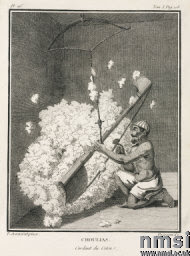
I happened to be standing at the gate when the cotton carder went by. Hearing the high pitched sound of his carding bow was a Proustian experience as it brought back a flood of long-forgotten memories.
There was a time when you could plan your day with almost clockwork precision just by listening to he sounds of the passing hawkers. There use to be many in our street: the vegetable and fruit vendors, the cobbler, the kabariwalahs the best recycling man ever. There was the man repairing jewels, the one who sharpened your knives and even one to clean your ears. Not to forget the toy vendor, the ice cream seller and so many more, each with their own calls that brought the street alive. Some were perennial, others seasonal, but to many like us they became familiar faces that were part and parcel of our lives.
Today there but a few, particularly in up market areas where forbidding gates with placards barring entry to hawkers have sounded their death knell. And with it the end of many small jobs that fed families and many trades that will soon be forgotten, trades that often use to be passed on from father to son.
I recently spent time with a shopkeeper friend whose shop came under the sealing hammer and who will move on the a mall miles away. His shop sold a medley of items; a great place to buy that gift one often remembered at the last moment. Over the years one had established a relationship with him and his family, seen the son get married and witness the birth of the grand child. Many recipes, and pieces of advise were shared, not forgetting the cups of tea! As I left the shop, my precious packet tucked under m arm, I realised that it would people of my generation who would feel the loss the most. The shopkeeper will find a new life in his squeaky clean mall, and will soon have a new clientele; for him it is a matter of survival. But we, the middle-aged middle-class middle everything individual will find ourselves disorientated.
I do not see myself trudging to an impersonal mall miles away for that gift. An appropriate amount of money in an envelope would have to do.
A was filled with sadness as I saw that one more chapter of our lives was ending. We had no option but to adapt as best we could and we would ultimately. But as I looked at the face of the brave cotton carder, now aged and tired, hoping that someone would stop him, I imagined the numerous evenings when he would have returned empty handed and his family would have slept hungry. At his age he had no other option and had had to fight the advent of polyfill quilts alone and bravely.
In our rush to embrace modern ways, do we realise the price that needs to be paid.

